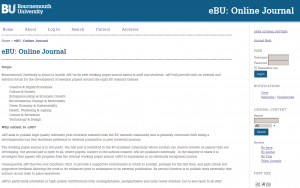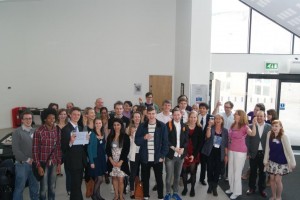My colleagues and I have written several papers to help budding researchers about the process of writing and publishing academic papers (Hundley, & van Teijlingen 2002; van Teijlingen 2004; Pitchforth et al. 2005; van Teijlingen et al. 2012; Simkhada et al. 2013). For all researchers – students and staff alike publishing research findings is important as new insights will add to the existing knowledge base, advance the academic discipline and, in the case of applied research, perhaps improve something in the lives of others such as, well-being, the economy or the environment. Apart from this general/altruistic drive to add to knowledge, the advice academics give our postgraduate students is: to get your study published as soon as possible. The two main reasons for publishing early are: (a) getting into print to potentially help your careers; and (b) staking once claim as an authority in the field and/or publishing your findings before someone else does.
As always there are exceptions to the rule. As academics we agree that trying to get into print early is a good personal strategy for an early researcher or a postgraduate student especially for those working with empirical or experimental data. However, occasionally it is better to wait and give the underlying idea in the paper time to develop and mature. The kind of paper that often improves with time is one based on theory. Let me share a personal example: a theoretical paper from my PhD (awarded by the University of Aberdeen in 1994). This paper started life as a theory chapter in my PhD thesis (van Teijlingen 1994). This chapter on models of maternity care was not the strongest part of my thesis and it took me another decade of fine-tuning to get it into a state worth publishing. The paper ‘A Critical Analysis of the Medical Model as used in the Study of Pregnancy and Childbirth’ was finally published in Sociological Research Online, the original online-only Sociology journal in the world (van Teijlingen 2005). The wait was worthwhile as the paper is today (May 2013), eight year after publication, the seventh ‘most viewed articles during the past eight weeks’ in the journal (see: http://www.socresonline.org.uk/stats/top20.html).
In conclusion, it is generally sound advice to new researchers and postgraduate students to publish early. Occasionally though, waiting and giving your paper time to improve through discussion with colleagues, presenting the ideas at conferences and on blogs may lead to a better final product.
Prof. Edwin van Teijlingen
Centre for Midwifery, Maternal & Perinatal Health
School of Health & Social Care
References
Hundley, V., van Teijlingen E. (2002) How to decide where to send an article for publication? Nursing Standard 16(36): 21.
van Teijlingen (1994) A social or medical comparison of childbirth? : comparing the arguments in Grampian (Scotland) and the Netherlands (PhD thesis), Aberdeen: University of Aberdeen. Available online in the British Library (search for: uk.bl.ethos.387237 ).
Teijlingen van, E. (2004) Why I can’t get any academic writing done, Medical Sociology News 30 (3): 62-6.
van Teijlingen, E. (2005) A Critical Analysis of the Medical Model as used in the Study of Pregnancy and Childbirth, Sociological Research Online 10(2) Freely available online at: www.socresonline.org.uk/10/2/teijlingen.html.
Pitchforth, E., Porter, M., Teijlingen van, E.R., Forrest Keenan, K. (2005) Writing up and presenting qualitative research in family planning and reproductive health care, Journal of Family Planning & Reproductive Health Care 31 (2): 132-135.
Teijlingen van, E., Simkhada. P.P., Simkhada, B., Ireland, J. (2012) The long and winding road to publication, Nepal Journal Epidemiology 2(4): 213-215. http://nepjol.info/index.php/NJE/article/view/7093
Simkhada, P., van Teijlingen, E., Hundley, V. (2013) Writing an academic paper for publication, Health Renaissance 11 (1): 1-5. www.healthrenaissance.org.np/uploads/Pp_1_5_Guest_Editorial.pdf


























 SPROUT: From Sustainable Research to Sustainable Research Lives
SPROUT: From Sustainable Research to Sustainable Research Lives BRIAN upgrade and new look
BRIAN upgrade and new look Seeing the fruits of your labour in Bangladesh
Seeing the fruits of your labour in Bangladesh Exploring Embodied Research: Body Map Storytelling Workshop & Research Seminar
Exploring Embodied Research: Body Map Storytelling Workshop & Research Seminar Marking a Milestone: The Swash Channel Wreck Book Launch
Marking a Milestone: The Swash Channel Wreck Book Launch ECR Funding Open Call: Research Culture & Community Grant – Application Deadline Friday 12 December
ECR Funding Open Call: Research Culture & Community Grant – Application Deadline Friday 12 December MSCA Postdoctoral Fellowships 2025 Call
MSCA Postdoctoral Fellowships 2025 Call ERC Advanced Grant 2025 Webinar
ERC Advanced Grant 2025 Webinar Update on UKRO services
Update on UKRO services European research project exploring use of ‘virtual twins’ to better manage metabolic associated fatty liver disease
European research project exploring use of ‘virtual twins’ to better manage metabolic associated fatty liver disease